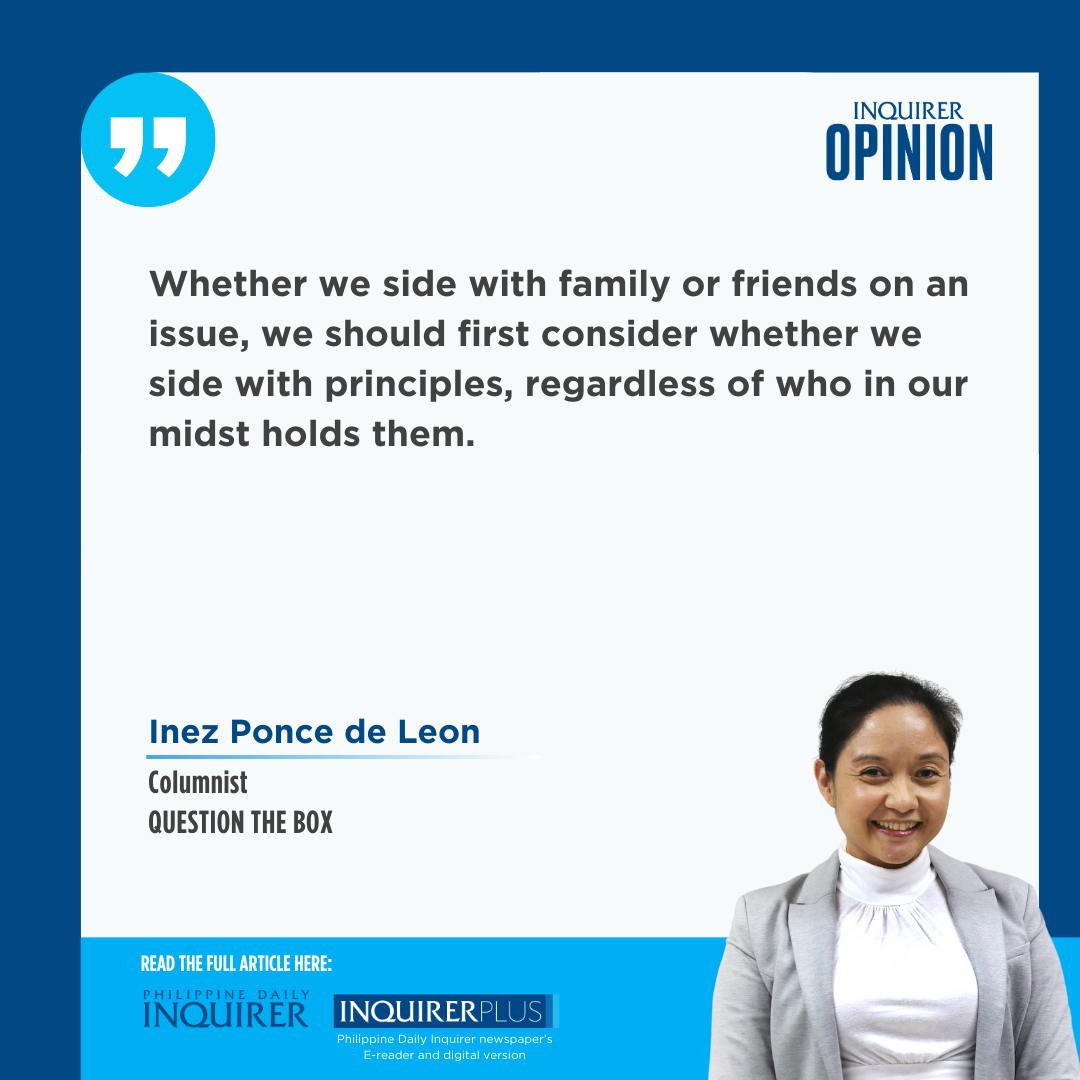Breaking toxic ties
One of the first proverbs that prompted me to do research on evolving adages is “Blood is thicker than water,” simply because we keep seeing its implications popping up in our headlines.
To some, the adage has always meant: Family ties will be stronger than those created by friendship. If you do something right, you’re expected to credit your family. If you earn from that triumph, then you owe your family the lion’s share of the profit. If you do something wrong, then your family will always welcome you back with love and will even defend your wrongdoing.
Article continues after this advertisementThose latter two ideas are the most toxic (demonic) implications of the phrase. They also bring me to a recent, contrary interpretation.
Some writers online claim that the phrase is a truncated version of a Bible verse, which supposedly reads “The blood of the covenant is thicker than the water of the womb.” That is: The blood shed by soldiers in battle binds them closer than the womb that they shared with their brothers and sisters. The adage is now reversed: Friendship is stronger than family.
Those who side with the Family version argue that the use of “blood” to refer to family has been in use since ancient Greek times. Those who side with the Friends version argue that the “blood covenant” has been documented in multiple sources, including the Bible and Arabic writings.
Article continues after this advertisementThere is no such Bible verse, however, that literally links a blood covenant with the water of the womb. The Arabic proverb, for its part, talks about milk and water: Blood brothers (those who have tasted each other’s blood in battle) are stronger in bond than those who nursed at the same breast.
While both sides claim a basis in historical research, the use of “blood” to refer to family is considered a convention, accepted with the passage of time regardless of its source. This represents an example of how language is neither static nor standardized. When there are rules to be followed, such as in formal academic writing, then the rules of grammar apply, and flowery sentences or fragmented thoughts cannot stand as substitutes for good logic. For everyday use, however, language is dynamic and unfettered: words can change meaning; what was taboo yesterday might be acceptable today, whether it’s the misused “in lieu of” to mean “in view of,” or the ear-shattering “irregardless.”
Perhaps blood has always been about family in some cultures; in others, blood can stand for alliances and friendship. We can never tell, with our thousands of languages across the world, our thousands of cultures and their norms. We cannot expect a standard definition to account for all human interpretations of words that have been translated and back-translated into different languages. All our languages carry their own meaning, culture, and history.
But we do have to be critical about what we truly mean.
Another idea that seems to arise from the blood and water proverb is the false, forced dichotomy of family versus friends, as though there were always two choices alone.
Family might include that grandparent who can listen to new ideas; but it also includes that tito who idolizes cussing presidents, follows conspiracy theories, and spreads misinformation while bemoaning the youth’s “lack of respect for their elders,” or that tita who inserts herself into all conversations with inane remarks on people’s weight, marital status, or lack of children, while bemoaning an independent nephew or niece for not “giving back to the family.”
Should these two be respected on equal footing with the grandparent? Are they all equally “family”?
Friends might include someone calling out racial slurs on X, but who might not speak out against the Philippine government when its own atrocities come to light. Should such a friend be held on equal standing as another friend who fights for the oppressed regardless of who those oppressed people are? Are they equally “friends”?
What do we truly value, when we first look at familial bonds but refuse to correct those closest to us, only because of proximity? In setting friends against family, we again remove the nuance of relationships and reduce respect to mere ties. We again limit respect to age equated with authority.
Perhaps we can also look at the “blood of the covenant” as a standalone Bible phrase. In the Old Testament book of Exodus, it represents God’s covenant with humanity, where principles and morals are held in great regard. The “blood of the covenant is thicker than the water of the womb” is now an adage that means “principles win versus any ties that bind.”
This is consistent with Jesus’ teaching later: Whoever seeks to follow Me must leave his family.
Note that this is not a literal leaving. Instead, it is a departure from the ties to which we are bound as children, but which we must surrender as adults when we recognize wrongdoing.
Whether we side with family or friends on an issue, we should first consider whether we side with principles, regardless of who in our midst holds them.
——————
















